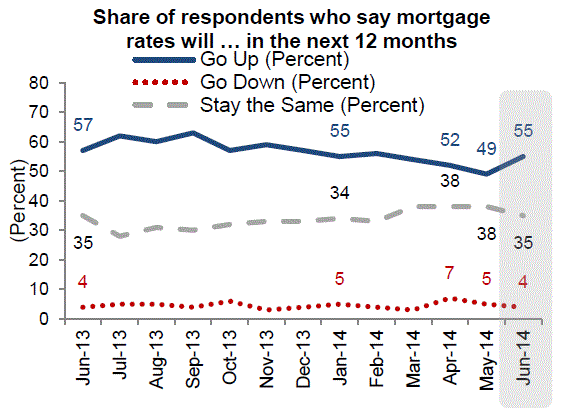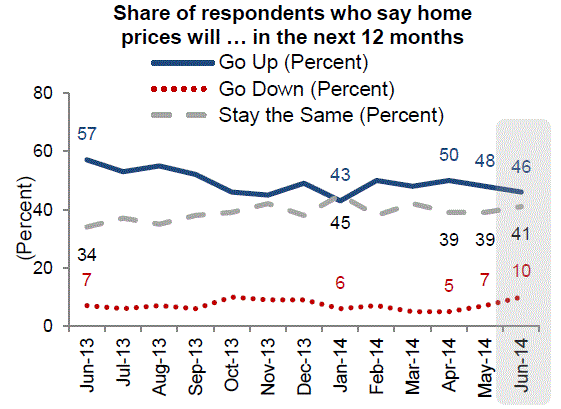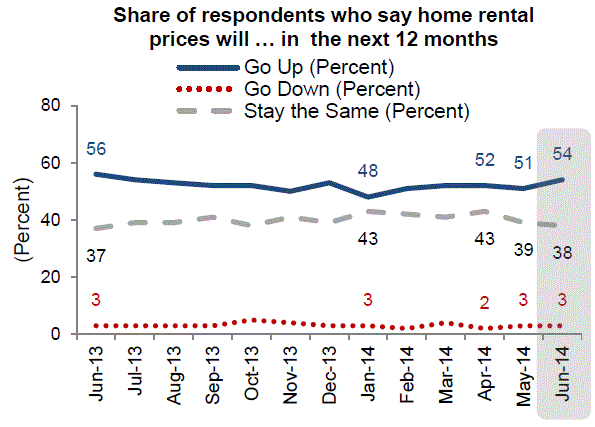Blog

Consumers Increasingly Expect Higher Rents and Lower Home Prices
Responses to Fannie Mae’s NationalrnHousing Survey for June showed more marked changes in several categories thanrnhas been the case in recent months when data has been relatively flat. Most of the changes indicted slowlyrnincreasing confidence in the housing market and in the economy in general,rnhowever the greatest change was in consumer expectations about interest rates. </p
In January 55 percent of respondentsrnexpected interest rates to rise over the ensuing 12 months, but as ratesrnsoftened those responses drifted back down and in May only 49 percent expectedrnhigher rates. In the latest survey thatrnresponse shot up 6 points, returning to 55 percent. </p
 </p
</p
Fannie Mae noted that consumerrnconfidence in the housing market has trended upward significantly during thernrecovery but continues to be less than needed to return to “normal”rnhousing levels. While consumers appearrnpositive overall and are trending in that direction, some survey and marketrnindicators reflect a more subdued housing market, underscoring that thernrecovery continues but is not yet robust.</p
The number of respondents who thinkrnthis is a good time to buy a house rose 2 percentage points from May to 70rnpercent but those who think it is a good time to sell reversed a four monthrnclimb to drop from 43 to 40 percent.</p
The share of respondents who sayrnhome prices will go up in the next 12 months fell to 46 percent, and whilernexpectations for that increase remained positive at 2.4 percent, that wasrnslightly lower than in the previous two months likely, Fannie Mae said, inrnresponse to a lackluster housing picture in the first half of the year. The share who say home prices will go down</bincreased to 10 percent. </p
 </p
</p
“Since we began collectingrnmonthly National Housing Survey data in June 2010, we’ve seen substantialrnprogress in consumer home price expectations and other key attitudinal measuresrnas the housing recovery gained its footing,” said Doug Duncan, senior vicernpresident and chief economist at Fannie Mae. “Still, we do not expect tornsee ‘normal’ levels of new residential construction, in the region of 1.6rnmillion new housing units per year, before the end of 2016, our originalrnprojection. Such a feat would require a pace of growth in housing starts notrnseen in decades.”</p
“The uptick this month in thernshare of consumers expecting mortgage rates to go up and the accompanyingrndecline in home price expectations reflect the pause of activity in the housingrnmarket so far this year,” said Duncan. “Despite recent improvement,rnwe now expect an annual decline in existing home sales due to weak volume inrnthe first four months of the year associated with the rise in mortgage ratesrnmid-last year and the current dearth of supply of lower-priced homes. On thernbright side, the share of employed consumers who expressed concerns aboutrnlosing their job dropped to an all-time survey low in June, consistent withrnlast week’s upbeat jobs report. This may encourage potential homebuyers tornenter the purchase market in 2014, helping to offset some of the weakness inrnsales activity.”</p
Fifty-four percent of respondentsrnexpect rental prices to rise over the next 12 months compared to 51 percent inrnMay. The average 12-month price change expectationrnincreased to 4.3 percent from 3.9 percent.</p
 </p
</p
Fifty-two percent of respondentsrnthought it would be easy for them to get a home mortgage today, increasing fromrn49 percent and matching the all-time high. The share who say they would buy ifrnthey were going to move was slightly higher at 68 percent.</p
Americans seemed a bit more upbeat</bin June about both their personal financial situation and the economy as arnwhole. The share of respondents who sayrnthe economy is on the wrong track fell by 3 percentage points from last monthrnto 54 percent and those who expect their personal financial situation to getrnbetter over the next 12 months ticked up to 43 percent. Those who claim significantly lower incomernthan a year earlier was down 1 percentage point to 11 percent, a new all-timernlow however those who say their household expenses have increased significantlyrnover the same period rose 4 points to 38 percent.</p
The National Housing Survey isrnconducted monthly among 1,000 Americans, both renters and homeowners. Respondents are asked over 100 questionsrnduring a phone interview to assess their attitudes toward owning and renting arnhome, home and rental price changes, homeownership distress, the economy,rnhousehold finances, and overall consumer confidence. The survey has beenrnconducted since June 2010.
All Content Copyright © 2003 – 2009 Brown House Media, Inc. All Rights Reserved.nReproduction in any form without permission of MortgageNewsDaily.com is prohibited.
Latest Articles
By John Gittelsohn August 24, 2020, 4:00 AM PDT Some of the largest real estate investors are walking away from Read More...
Late-Stage Delinquencies are SurgingAug 21 2020, 11:59AM Like the report from Black Knight earlier today, the second quarter National Delinquency Survey from the Read More...
Published by the Federal Reserve Bank of San FranciscoIt was recently published by the Federal Reserve Bank of San Francisco, which is about as official as you can Read More...

Comments
Leave a Comment